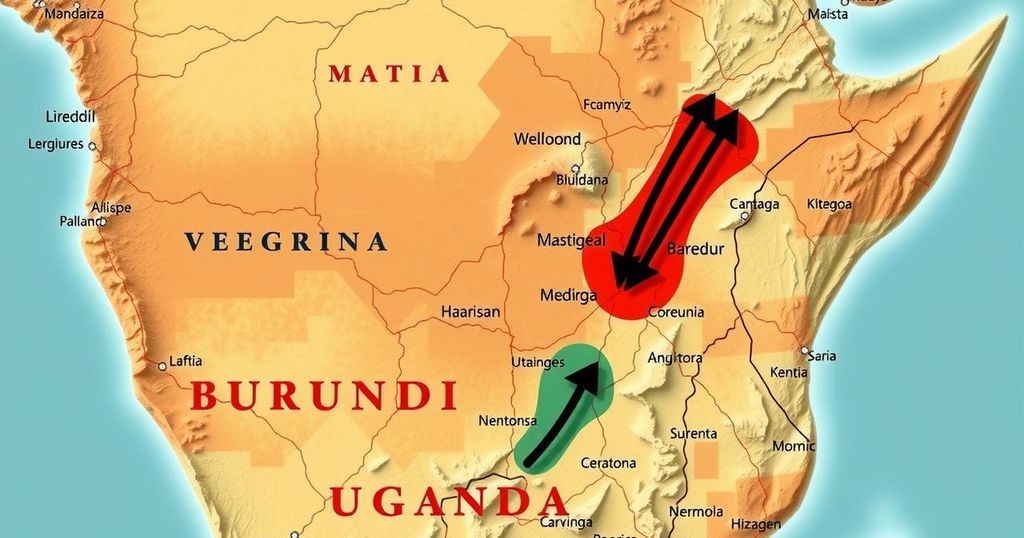Global news
AFP, AFRICA, BRITAIN, BUKAVU, BURUNDI, CIVIL WAR, CONGO, CONGO (KINSHASA), DEMOCRATIC REPUBLIC OF CONGO, DR CONGO, DRC, EUROPE, EXTREMIST GROUPS, GOMA, KAMANYOLA, LONDON, LUVUNGI, MILITARY, RWANDA, SANGE, SECURITY, SEXUAL VIOLENCE, UGANDA, UN, UNITED KINGDOM, UNITED NATIONS
Leila Ramsay
0 Comments
Regional Tensions Rise as Violence Escalates in Eastern DRC
As violence spreads in the eastern Democratic Republic of Congo, Burundi withdraws troops while Uganda secures Bunia in the wake of significant clashes with the M23 group. The deteriorating security situation raises fears of a repeat of the devastating Congo wars, exacerbated by accusations of human rights violations and external interference. Regional stability remains critical as analysts warn of potential spillover effects.
Countries bordering the eastern Democratic Republic of Congo (DRC) have been on high alert due to escalating violence from armed groups, notably the Rwanda-backed M23. Burundi has recently withdrawn its troops from certain segments of the DRC, while Uganda has successfully established a military presence in the strategically important city of Bunia. There are concerns that the intensifying hostilities may rekindle the devastating Congo wars of the late 20th century, which had grave humanitarian consequences.
The surge of violence is evident as the M23 group has gained control over substantial territories, including crucial urban centers like Goma and Bukavu. Senior military officers from Burundi reported the need for tactical withdrawals due to heavy clashes, particularly highlighting the precarious situation across the border. The Burundian military had previously committed over 10,000 troops to support the Congolese army against the M23 while also targeting Burundian rebel factions operating within the area.
Despite the official denial of any retreat by Burundi’s army spokesman, reports indicated that soldiers had been dislodged from key locations and returned in distress, lacking supplies. The deteriorating conditions of the troops have raised alarm among local officials, who noted that many have faced hunger and shortages of ammunition as they withdrew.
The violence accompanying the M23’s advance has resulted in substantial casualties, including the recent alarming claims of child executions. The United Nations raised concerns regarding serious human rights violations, emphasizing the tragic fate of children who have been forcibly enlisted and killed. This situation has prompted the British government to express discontent with Rwanda’s actions, emphasizing the issue’s regional implications.
While Rwanda asserts that it does not have direct military involvement in the conflict, past reports suggest its military has collaborated with the M23. The Congolese government accuses Rwanda of harboring expansionist pursuits and exploiting the DRC’s mineral wealth, intensifying regional tensions as the M23 maintains strategic control over Lake Kivu, facilitating transportation in the area.
In response to local insecurity, Uganda has deployed forces into Bunia following an agreement with the DRC government. Uganda’s intervention is primarily in reaction to militia-led massacres and reflects concerns of potential violence spilling over and affecting its own security. Analysts highlight that while the situation in Uganda differs from the M23 crisis, the overall instability poses an imminent threat throughout the region.
Experts warn of the potential for the current unrest to replicate the historical dynamics that led to the Second Congo War, which involved numerous African nations and culminated in widespread devastation and loss of life. The prevailing sentiment is one of urgency as regional actors mobilize in a bid to prevent further escalation while navigating the complexities of local and international dynamics affecting the DRC.
The ongoing violence in the eastern Democratic Republic of Congo poses a significant risk of rekindling past conflicts, necessitating urgent responses from neighboring countries. Burundi’s troop withdrawal and Uganda’s military actions reflect growing concerns regarding regional stability and humanitarian crises. The situation remains precarious as armed groups like the M23 exert control and commit serious human rights abuses, drawing international scrutiny and potential repercussions. These developments could lead to a broader confrontation reminiscent of the Congo wars, prompting a call for strategic measures to avert further turmoil.
Original Source: www.blackbeltnewsnetwork.com




Post Comment